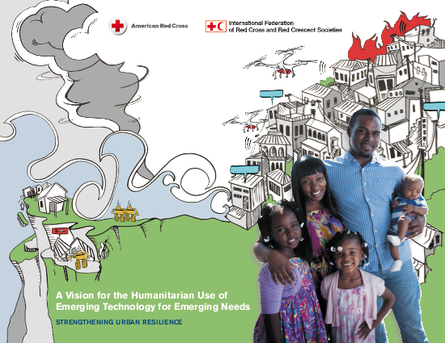
The report reviews the global dialogue series organized by the American Red Cross and IFRC, defines our Eight Criteria for Resilience-Strengthening Solutions, announces our plans to test four experimental technologies with partners this year, and makes five key recommendations based on community-level requests and our humanitarian expertise.
The publication explains how we chose the initial eight emerging technologies, the many ways they can help urban dwellers cope with emergencies and how we arrived at the following four priorities for 2015-2016: • Wearable devices for providing early warning, supporting search and rescue, and reconnecting families • Unmanned aerial vehicles for temporarily restoring communications networks and delivering critical relief items, such as medicines, post disaster • Smart home sensor networks for sensing and reporting fires in informal settlements/slums • Biometric scanners in ATM-like kiosks for restoring lost documentation to prove identity, access assistance and reconnect families Inside, you will also learn about the innovation teams, comprised of at-risk community members and multi-sector volunteers who will help us take these ideas forward in several countries around the world. They will co-facilitate experiments to help inform the technologies’ design, use and cost to ultimately support consumer access, management and ownership of these resilience-strengthening solutions.
Links
Resource collections
- Innovation
- UN Habitat - Urban Response Collection
- Urban Response - Urban Crisis Preparedness and Risk Reduction
- Urban Response Collection - Community Engagement and Social Cohesion
- Urban Response Collection - Economic Recovery
- Urban Response Collection - Environment and Climate Change
- Urban Response Collection - Housing, Land and Property
- Urban Response Collection - Urban Crisis Response, Recovery and Reconstruction
- Urban Response Collection - Urban Resilience
